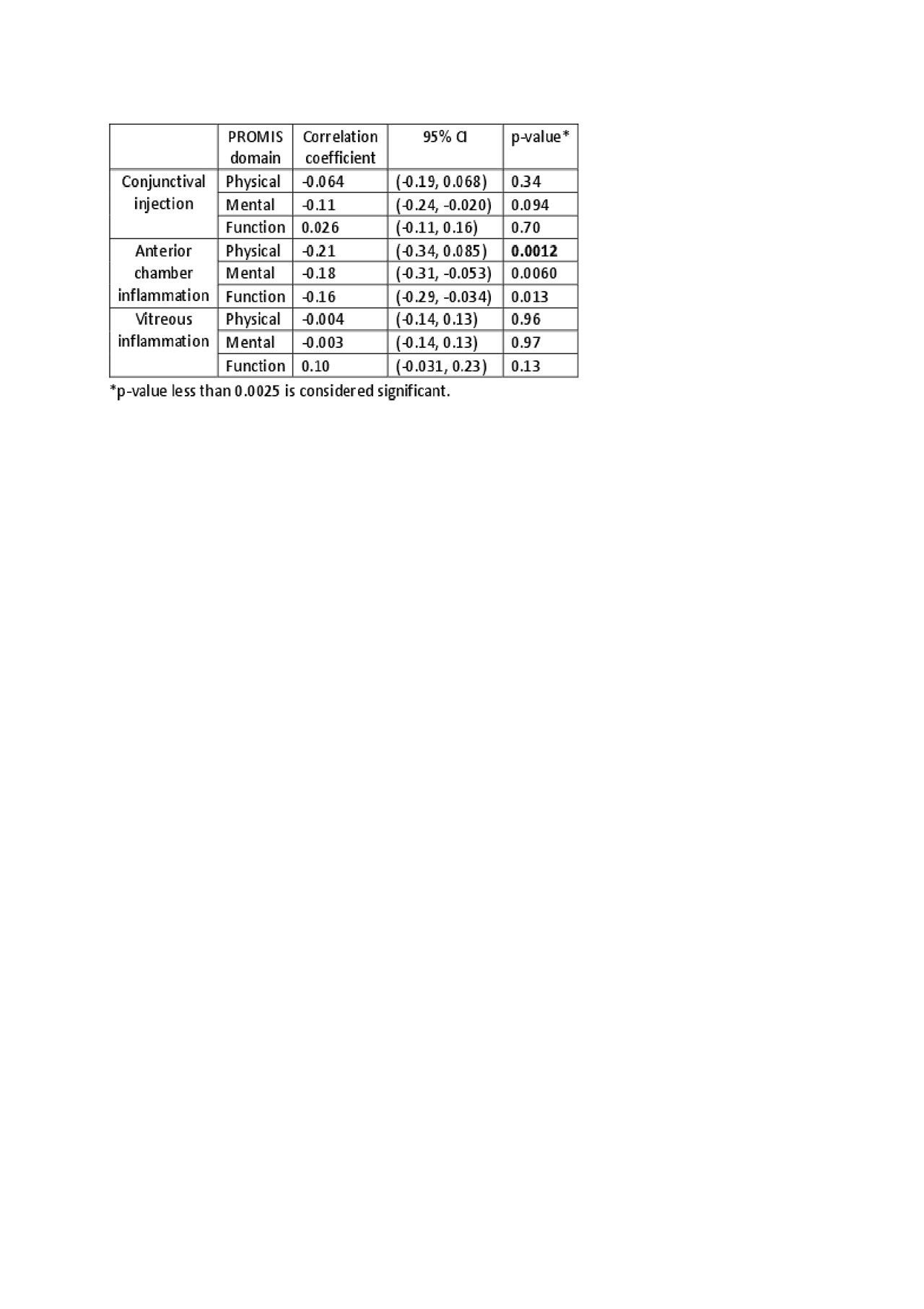Session Information
Session Type: Poster Session (Monday)
Session Time: 9:00AM-11:00AM
Background/Purpose: Diagnosing and managing patients with inflammatory eye disease (IED) requires close interdisciplinary care with rheumatologists adjusting systemic, potentially toxic, therapies based on exam findings visualized by ophthalmologists. Surveys of patient reported outcomes have been used to influence medical decision making in other chronic medical conditions (including rheumatologic disease), but utility has not been assessed in patients with IED. We evaluated use of PROMIS (Patient-Reported Outcomes Measurement Information System) data in tracking ocular disease activity and response to therapy in these patients.
Methods: We identified patient charts containing an ICD code diagnosis for uveitis or scleritis, who were seen two or more times by specialists in IED through Cleveland Clinic’s rheumatology and ophthalmology departments between July 2016 and December 2018. These charts were individually reviewed to ensure there were at least two data points available for study inclusion where PROMIS data was collected within two weeks of a documented ophthalmic exam. Demographics and disease characteristics were noted. PROMIS data and ophthalmic exam findings were documented for each patient’s initial and each subsequent encounter meeting inclusion criteria.
Results: 87 patients were included in final analysis (74 uveitis patients and 13 scleritis patients). We found no significant differences in PROMIS or PHQ scores when comparing uveitis to scleritis patients. In regards to correlation of specific exam findings to different PROMIS measures, there was found to be a significant negative correlation (r = -0.21, p = 0.0012) between extent of anterior chamber inflammation and reported physical health PROMIS scores. Presence of vascular leakage on fluorescein angiography was found to be associated with worse physical health PROMIS scores at 1 year follow-up (p = 0.007), though this was not seen at other time points. No association between PROMIS scores and OCT findings was discovered. In comparing groups of patients on different therapies, there were no significant differences found in PROMIS scores reported in patients on biologic vs nonbiologic therapies.
Conclusion: Anterior chamber inflammation correlated with worse reported physical function which is likely a consequence of anterior chamber inflammation more frequently causing symptoms apparent to the patient thereby affecting their perceived health. Presence of vascular leakage on fluoroscein angiography was found to be associated with worse physical health PROMIS scores at 1 year follow-up. Our findings warrant further investigation into how patient reported outcomes can assist in monitoring ocular disease activity outside of an ophthalmology exam room.
To cite this abstract in AMA style:
Hedrick J, Hajj-ali R, Jin Y, Srivastava S. Using PROMIS Data to Assess Activity of Inflammatory Eye Disease [abstract]. Arthritis Rheumatol. 2019; 71 (suppl 10). https://acrabstracts.org/abstract/using-promis-data-to-assess-activity-of-inflammatory-eye-disease/. Accessed .« Back to 2019 ACR/ARP Annual Meeting
ACR Meeting Abstracts - https://acrabstracts.org/abstract/using-promis-data-to-assess-activity-of-inflammatory-eye-disease/

